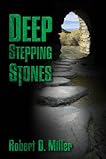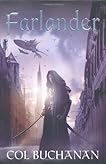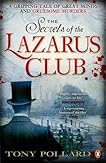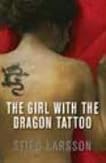 Deep Stepping Stones by Robert Miller
Deep Stepping Stones by Robert MillerMy rating: 3 of 5 stars
Really, 2.5 stars, so I rounded up. :-)
Disclaimer: I know the author – he was my high school track coach.
Deep Stepping Stones is set in modern-day Montana, and follows the exploits of 2 FBI agents investigating the disappearance of 2 other agents, whose disappearance may or may not be related to a terrorist cell somewhere in the state. It is a fairly tight suspense novel, without any egregious plot holes, but I do have a few nits to pick, upon which I will elaborate momentarily.
But first a few words on the writing style – it is extremely detailed, down to describing the color of the agents’ socks, or their exact jogging route through the streets of Butte. While this serves to give the reader a feeling of really being there, a few times it moved into the realm of distraction, as when we are treated to 2 paragraphs describing the likes, dislikes and mindset of one of the agents wives, whom we never meet. I did get used to the detail after a while, and it really helped during the description of the last, desperate raid on the terrorist hide out, where the detailed description of the house layout (including a floorplan) enabled one to really get immersed in the action. Other times, however, it seemed like Miller was writing a tourist guide for Butte (or Jackson Hole), which, for my taste, went a bit overboard.
One of the things that bugged me the most was the lack of differentiation among the characters. They all spoke the same way (even the “bad guys”) and I never got the feel for who these guys really were. The minutae of descriptors merely served to overwhelm me with details, and didn’t do anything to really let me see into these guys’ heads. It was a case of the author “telling” me about the characters, rather than “showing” me, by their actions and dialog.
My largest complaint about the plot was the seemingly laid-back approach the agents took when a US Senator was kidnapped. They would knock off at 6pm and go have long, leisurely meals and then turn in for the night. And there weren’t any more agents brought in on the case – I would think that the kidnapping of a US Senator (even if he is from Idaho) would involve more than 2 agents, and there would be enough of a sense of urgency that they would work in shifts around the clock.
Don’t get me wrong, in the end, I enjoyed the book. But I do think it could have been better. Of course, I have never written a book, so I have to give props to Mr. Miller for even doing so, and for getting it published! I do hope he writes another book, because I think he will improve as a writer, and this one definitely shows promise! (Let’s face it – I’m downright envious that he had what it took to write it in the first place! I admire that ability, greatly!)
































